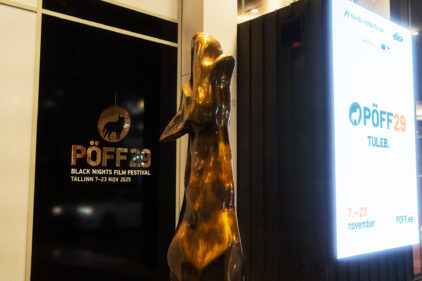Here are some of the highlights, and otherwise, of the first four days at Sundance:
Aidan Quinn, the Chicagoan who now works frequently in Ireland, is here with the angry, moving “Song for a Raggy Boy,” directed by Aisling Walsh. His performance is direct and strong, a rebuke to the usual wimpy teachers in school stories. Set in 1939 at a church-run Irish reformatory school for young boys, it stars Quinn as a lay teacher, an idealistic veteran of the Spanish Civil War, where he lost the woman he loves. Now he faces a horrifying situation of brutality and sexual abuse; the genial, compromising priest in charge is intimidated by another priest, a sadistic disciplinarian.
Arriving hard on the heels of “The Magdalene Sisters,” another attack on Irish church institutions, it continues the rewriting of Irish history. If Bill Donahue of the Catholic League hated the earlier film, he will implode after this one.
David Gordon Green’s “George Washington” was one of the best films of 2000. Now just 27, he’s back with the stylistically similar “All the Real Girls,” set in the industrial landscapes of a North Carolina mill town, and watching and listening with a special lyrical intensity to the love affair between Paul (Paul Schneider) and Noel (Zooey Deschanel), who feel their love is special and yet are doomed to test it. Green has a gift for moments of acute observation, for dialogue both naturalistic and uninflected, for mood over plot, for poetry over prose. It’s a lovely film.
After the screening of Thomas Vinterberg’s “It’s All About Love,” a woman in the audience stood up and asked him to forgive her, but said, “I don’t have a clue what the movie is about. Can you explain it, so I know what to say to my friends?”
Vinterberg, one of the founders of the Dogma ’95 movement and the director of the powerful “Celebration,” was not pleased. “The film speaks for itself,” he said.
Alas, it does not. It is a murky, slow, boring and pointless parable set in the near future, when there is a global ice age and other strange phenomena, like hearts that stop because of love, and Ugandans who suddenly begin to fly. The lead character, played by Claire Danes, is an ice skater who is about to be replaced by doubles. Not since Robert Altman’s “Quintet,” also set in snow and ice and in the future, has there been such an inexplicable film by an important director.
“Dopamine,” directed by Mark Decena, is set amid the ashes of the dot.com boom in San Francisco, where a computer programmer (John Livingston) attempts to create an animated bird that will become a child’s loyal friend. He meets a young woman (Sabrina Lloyd) at a bar one night, and again when she’s the teacher in a classroom where he tests his little bird. They fall in love, but does he want a love that is unquestioning and loyal and programmed by him? The movie has a sweet offhand romantic tone, in which old-fashioned notions of love encounter the alienation of demanding occupations.
Of “dot the i,” a film by Matthew Parkhill, I can say only that it has several twists too many. It begins as a perfectly good, indeed engrossing, love story involving a Brazilian (Gael Garcia Bernal of “Y Tu Mama Tambien“) and a Spaniard (Natalia Verbeke), who meet cute in a London restaurant and fall in love during the last week before her planned marriage to a rich Brit (James D'Arcy). This story, followed through to the end, would have been enough, especially with its witty parallels to “The Graduate.” But then Parkhill makes a U-turn into one of those plots where everything has to be re-evaluated, and nothing is as it seems. A summation during which D’Arcy explains, or doesn’t explain, is relentless in its endless detail.
“Confidence” is the new film by James Foley (“At Close Range,” “Glengarry Glen Ross“). It’s about a con game, masterminded by Edward Burns and enlisting Rachel Weisz, Paul Giamatti, Andy Garcia, Luis Guzman and, in a supercharged cameo, Dustin Hoffman as a porn king and bookie with ADD.
It’s a well-made commercial film, but the question I had as I watched the movie was–why is it at Sundance? It’s a big-budget caper picture with well-known stars, and will be released to thousands of theaters. Isn’t Sundance supposed to be a showcase for the independent cinema? Are the evening premieres in the big Eccles Center being skewed toward higher-profile movies? I depart now for the auditorium of the Park City Library, a less glamorous venue, to see two of those films I’ve heard so much about.











